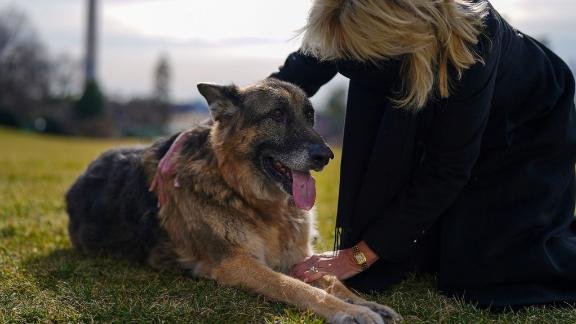The time has come to start training the pets for your return to work

Pets — like their humans — had to adjust during the pandemic.
They got used to people being at home most of the time, just as people learned how to juggle caring for their pets while also doing their jobs remotely.
But now, with Covid-19 vaccinations picking up, if you have a pet, it’s time to prepare them for your return to normal — whatever that may look like post-pandemic.
And, according to some animal experts, it’s going to take time for them to adjust.
Remember, they had to make adjustments too: Some pets had to make a real adjustment to the sudden 24/7 intimacy of people being home all day, especially in households with small children.
Others were adopted during the pandemic.
“The overall percentage of US households owning pets notched up to 56% in 2020, with 44% of households owning dogs, 25% owning cats, and 12% owning other pets (including fish, birds, small mammals, and reptiles/amphibians),” according to Packaged Facts, a market research firm.
“Among current pet-owning households, 35% adopted pets in the 12-month period ending February 2021,” Packaged Facts said.
That means millions of pets have no sense of what “normal” life looked like.
Start leaving them alone for a few hours at a time: So, if you’re planning a return to the office, Dr. Douglas Kratt, president of the American Veterinary Medical Association, recommends you start by leaving your pet for two or three hours at a time daily, so they aren’t caught off guard when you’re gone for eight or more hours a day.
… but don’t fully change routines just yet: While you may be changing your routine, Kratt told CNN it’s helpful to keep pets as close to their routine as possible and make sure that “you’re not forgetting things because you’re into a new routine.”
Dr. Dana Varble, chief veterinary officer for the North American Veterinary Community, suggests pet owners keep some of the habits formed during the pandemic, such as taking their dogs for a walk during their lunch breaks.
Consider a pet sitter: If your new normal doesn’t include time for that, Varble said it may be time to re-hire the dog walker or pet sitter you had before the pandemic, which can then give your pet some familiarity.
“In the last several years we’ve done a lot of research that’s shown that a lot of animals have a much more significant and longer lasting memory than we thought that they did,” Varble said.
Realize that readjustment times will vary: Pets will need about four weeks to adjust to a new routine, Varble said — but noted that different animals are more adaptable than others.
Cats, for example, she said, need longer and may show signs of stress for up to six months.
“Although they’re a lot more independent, I think that they really, really thrive on routine.”
Regardless, if you see unwelcomed behavior in your pet — including vocalizing or shredding of toys — Varble said “it’s really important” to stick with your routine. But, if you notice more harmful behavior, it’s OK to correct it, she said.
Leave some distractions around: Ingrid Johnson, certified cat behavior consultant at Fundamentally Feline, suggests cat owners find fun distractions for their cats while they’re gone, such as leaving cat videos or easy listening music on.
“We offer them these different novel things so we’re leaving, but there’s something fun to do,” Johnson told CNN.
She also said food puzzles are a great way to distract cats while making sure they’re able to eat in accordance with their internal clock.
“It gives them comfort to be able to control access to all their basic needs,” Johnson said, urging the importance for cats to have as much consistency as possible and that small environmental changes can cause them to stress.
Keep an eye on any behavioral changes: “Cats will generally symmetrically groom themselves bald in easy to reach areas when they’re anxious. Grooming is a comfort behavior,” Johnson said.
While grooming is not a big concern, Johnson said if cats are going to the bathroom outside the litter box or if they are not eating, that could be a medical emergency.
Remember your bond with your pet: Some of the changes of returning to in-person work and school will stress us out just as much as it stresses our pets.
That’s why experts say it’s important to remember you need your pet as much as your pet needs you.
“Pets can help us manage our stress and keep our calm,” Varble said. “I think it’s still important you celebrate your bond with your pet, your human-animal bond, as a great source of stress relief in your life.”
